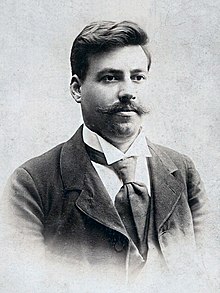Gotse Delchev
| Georgi Nikolov Delchev Георги Николов Делчев |
|
|---|---|

Portrait of Gotse Delchev
|
|
| Born | February 4, 1872 Kukush, Salonica Vilayet, Ottoman Empire (now Greece) |
| Died | May 4, 1903 (aged 31) Banitsa, Salonica Vilayet, Ottoman Empire (now Greece) |
| Nationality | Bulgarian |
| Organization | Bulgarian Macedonian-Adrianople Revolutionary Committees, (later SMARO, IMARO, IMRO) |
Georgi Nikolov Delchev (Bulgarian/Macedonian: Георги/Ѓорѓи Николов Делчев, known as Gotse Delchev, also spelled Goce Delčev, Cyrillic: Гоце Делчев, originally spelled in older Bulgarian orthography: Гоце Дѣлчевъ; (February 4, 1872 – May 4, 1903) was an important revolutionary figure in Ottoman-ruled Macedonia and Thrace at the turn of the 20th century. He was one of the leaders of what is known today as Internal Macedonian Revolutionary Organization (IMRO), a paramilitary organization active in Ottoman territories in the Balkans, at the end of the 19th and the beginning of the 20th century.
Born in Kukush, then in the Salonica Vilayet of the Ottoman Empire, in his youth he was inspired by the ideals of revolutionaries such as Vasil Levski and Hristo Botev, who envisioned the creation of a Bulgarian republic of ethnic and religious equality, as part of an imagined Balkan Federation. Delchev completed his secondary education in the Bulgarian Men's High School of Thessaloniki and entered the Military School of His Princely Highness in Sofia, but he was dismissed from there, because of his leftist political persuasions. Then he returned to Ottoman Macedonia as a Bulgarian teacher, and immediately became an activist of the newly-found revolutionary movement in 1894.
Although considering himself to be an inheritor of the Bulgarian revolutionary traditions, as a committed republican Delchev was disillusioned by the reality in the post-liberation Bulgarian monarchy. Also by him, as by many Macedonian Bulgarians, originating from an area with mixed population, the idea of being ‘Macedonian’ acquired the importance of a certain native loyalty, that constructed a specific spirit of "local patriotism" and "multi-ethnic regionalism". He maintained the slogan promoted by William Ewart Gladstone, "Macedonia for the Macedonians", including different nationalities inhabiting the area. In this way, his outlook included a wide range of such disparate ideas as Bulgarian patriotism, Macedonian regionalism, anti-nationalism and incipient socialism.
...
Wikipedia
